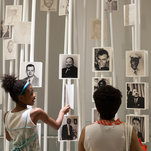SWARTHMORE, Pa. — On a recent Thursday evening, a courtyard on the 19th-century campus of Swarthmore College was unusually quiet. The beer pong tables near the dormitory rooms were temporarily empty, and students had scattered — except for a few who were inside one of the stone buildings, preparing to work into the early morning.
Haley Loram, 19, was typing a report on the abrupt resignation of Iraq's beauty pageant winner. "She's being called Queen of the Infidels," Ms. Loram mused. "That sounds like a band name."
Amelia Templeton, 22, was working on a piece about Baghdad's real estate market, while other reporters were examining an expert's analysis of the counterinsurgency.
This is the home of War News Radio, a weekly half-hour broadcast that aims to supplement the American news media's coverage of Iraq by using computer software and 20-something ambition. "They know more about Iraq than most reporters, except those reporters actually in Iraq," said Marty Goldensohn, a radio veteran and journalist in residence at the university.
On the air since March 2005, the program is gaining in popularity. Thousands of listeners hear it via the Web site, www.warnewsradio.org, where broadcasts are available every Friday through streaming audio or MP3 downloads. Also, 22 public radio stations in the United States broadcast it weekly, as well as stations in Australia and Italy.
David Gelber, a producer for "60 Minutes" and a 1963 alumnus of Swarthmore, came up with the idea in 2004 after remembering a similar program on Pacifica Radio during the Vietnam War with Paul Fischer as host. Mr. Gelber also realized the danger that makes it difficult for reporters in Iraq. "A lot of stories weren't getting covered," he said.
So he suggested the radio broadcast, even though Swarthmore had no journalism program and no reliable recording studio. Marjorie Murphy, a history professor, agreed to oversee the program, though some of her colleagues at this liberal arts college near Philadelphia initially pooh-poohed it as not meeting Swarthmore's rigorous academic standards, Ms. Murphy said.
The college recruited about a dozen students who soundproofed their first studio with egg cartons. Later, Swarthmore invested $100,000 in recording and editing equipment, and downloaded computer software, Skype, which allows users to call free anywhere in the world via the Internet. Students interviewed Mr. Goldensohn and hired him, he said, even after he told them their early writing samples were "incomprehensible, academic English."
But they were fast learners. "Now I rewrite maybe one sentence," Mr. Goldensohn said.
Tevye Kelman, 22, said the staff members decided to focus on stories they thought listeners could relate to, rather than "one long body count."
Their favorite broadcasts include an Iraqi's futile attempt to compete in the skeleton at the Winter Olympics and the dangerous experience of being at a checkpoint, both from the viewpoint of a solider and from an Iraqi father whose daughter was killed at one by a car-bomb attack.
Over the last year, the students have put together an online database of potential Iraqi sources.
"I've talked with American reporters, and we're both calling Baghdad," said Eva Barboni, 21. "They can't leave their hotel room, and they're calling a mile away. I'm calling from 6,000 miles away."
Ms. Templeton checks in regularly with an Iraqi college student. Once, when she could not reach him in a period of rising violence, she began to worry. A few weeks later she learned he had been caught in a crackdown: a parental one. He had not performed well on exams, and his father took away his cellphone. "It was an amazing moment" of cultural common ground, Ms. Templeton said.
The Marine Corps recently added a link to War News Radio from its Web site. Barak A. Salmoni, a civilian who provides educational and cultural resources to the Marines and who has taught a course about conflicts in the Middle East at Swarthmore in past years, said marines serving in Iraq have told him they sometimes listened. "They slap it on their iPods," Mr. Salmoni said.
Wren Elhai, 19, said the War News Radio staff had not absorbed the increasing attention: "We've all been too busy to really stop and think about how crazy all this really is."









